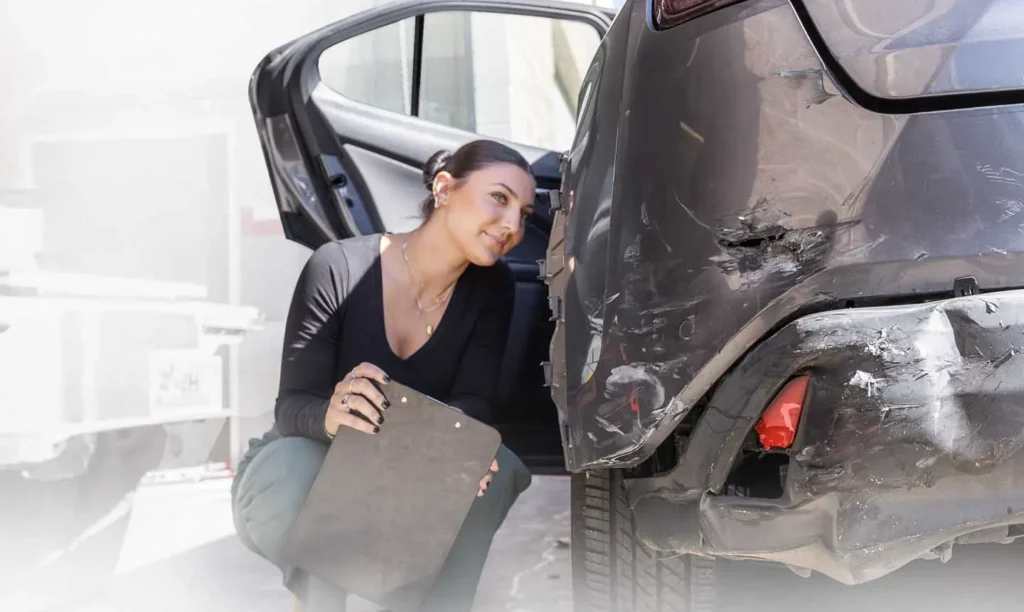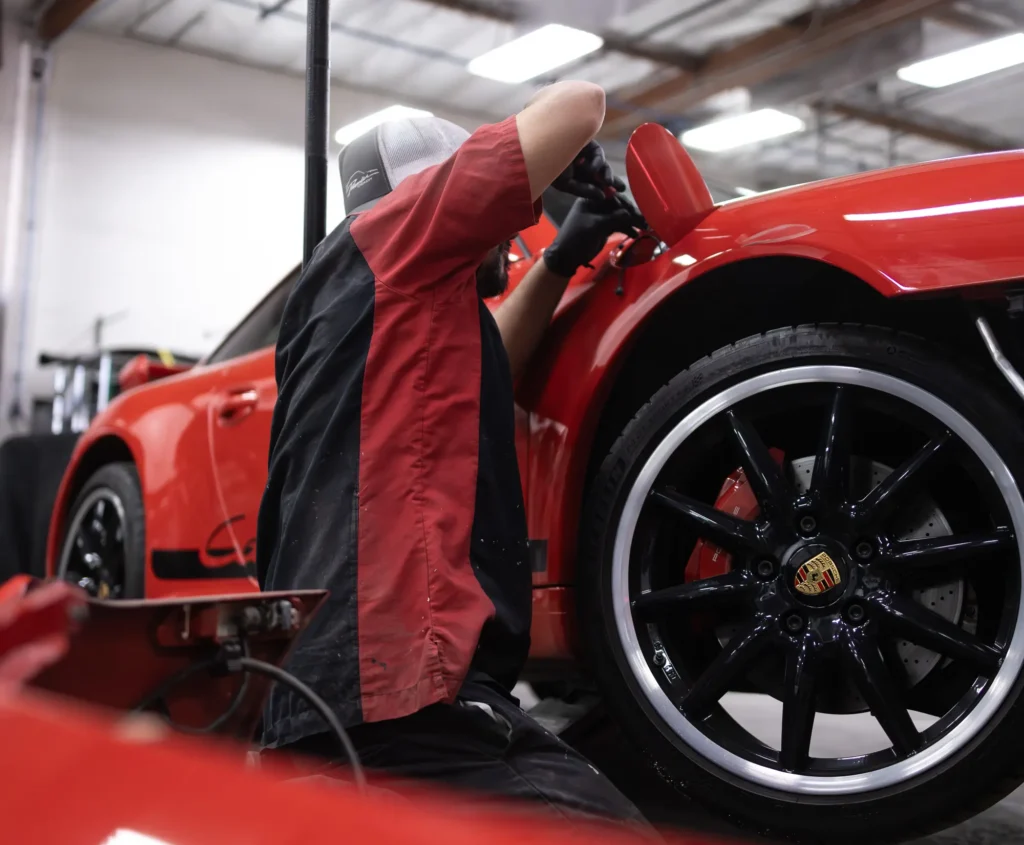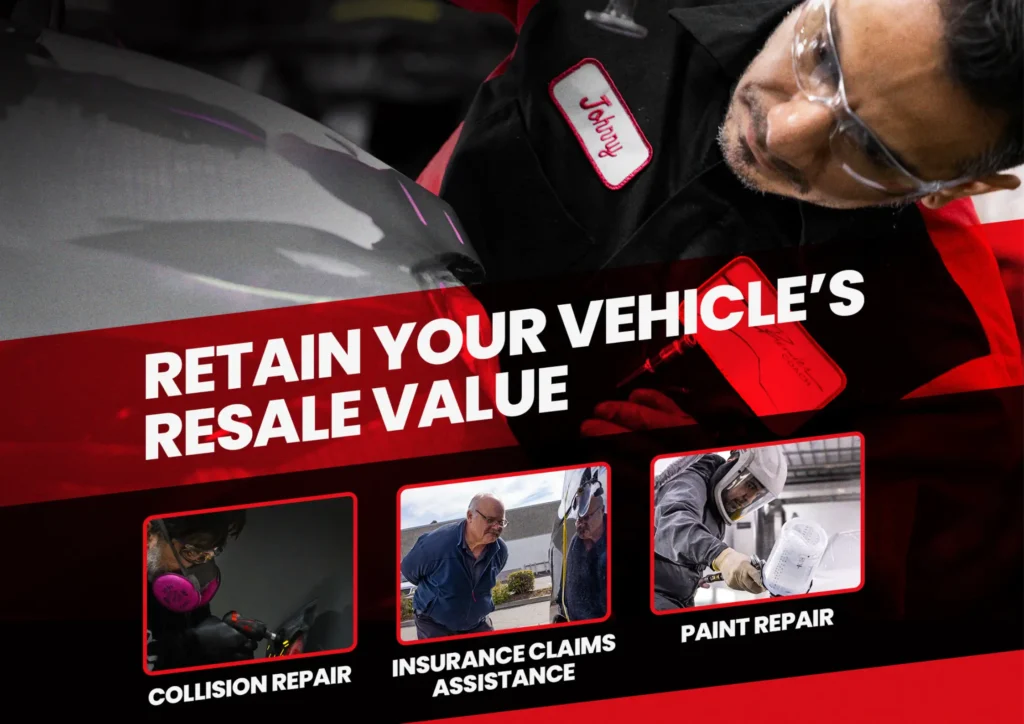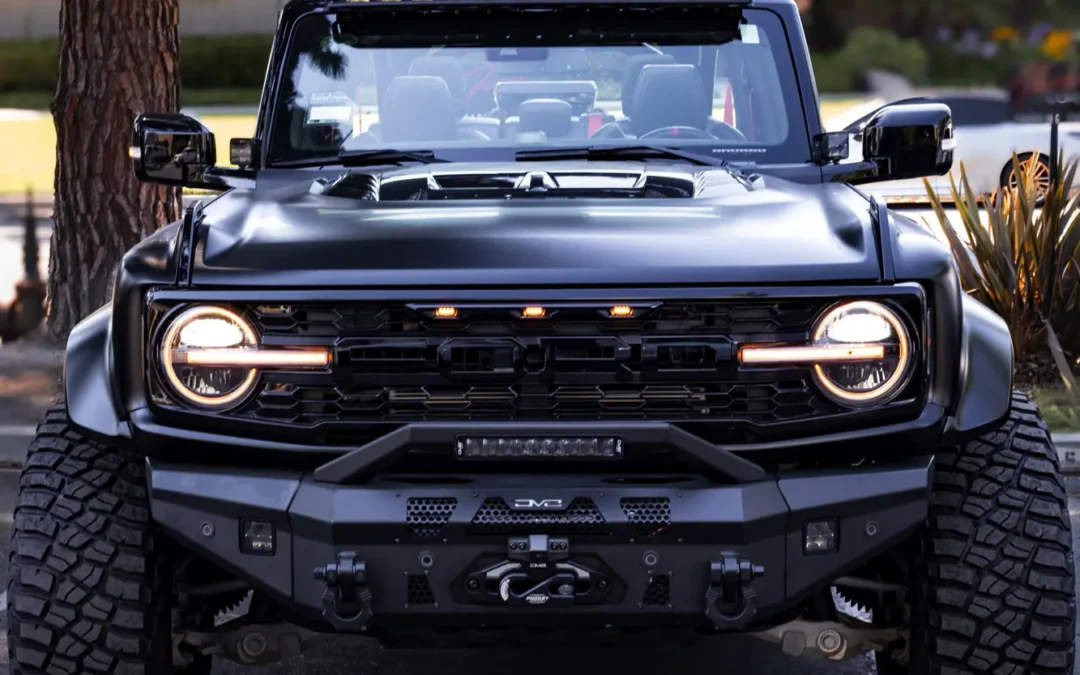When you’re ready to sell your vehicle, its resale value is crucial. Resale value is the amount someone will pay for your car. Several factors influence this. These include the car’s brand, age, mileage, and overall condition. For vehicle brands like BMW, Mercedes-Benz, Audi, Lexus, and Tesla, even minor damages can significantly reduce the car’s resale value. Here’s why it’s important to repair any damages properly.
How Does Auto Body Damage Affect Resale Value?
- First Impressions Matter: A potential buyer will first notice the exterior of your car. Any auto body damage, no matter how minor, can lead to lower offers. It may suggest you have not maintained the car well.
- Safety Concerns: Damage can raise concerns about potential safety issues beyond aesthetics. Buyers often become wary of unseen problems. This can decrease their interest in buying the vehicle.
- Cost of Future Repairs: Potential buyers will consider the cost of repairing existing damage. They often subtract this cost from their offer. This reduces the overall value of your car.

How Much Value Can Damage Cost? (Examples)
To illustrate the impact, here are examples of typical resale value losses for vehicles with various types of damage:
-
Superficial scratch or ding: These minor issues, when buffed out or touched up quickly, generally do not significantly impact resale value.
-
Moderate body damage (~$5,000 repair): Expect to lose about half the repair cost in resale value. This means a $5,000 repair could reduce the car’s value by about $2,500.
-
Major structural damage: This type of damage is more severe. If the car’s frame needed straightening or airbags deployed, the resale value could drop by 30–50% for a luxury model. For example, a $50,000 Mercedes-Benz might be worth only $25–35k after a serious accident.
What Is the Difference Between OEM, Aftermarket, and Used Parts?
When repairing your vehicle, the type of parts used can significantly impact both the quality and cost of repairs. They also affect your car’s resale value. Here’s a breakdown of the different types of parts:
OEM Parts (Original Equipment Manufacturer): These parts are made by the car’s manufacturer. They match the parts that came with your vehicle in fit, form, and function. They are more expensive but help maintain the car’s integrity, performance, and resale value. Using OEM parts is crucial. This ensures that the vehicle is restored to its original specifications, which buyers expect.
Aftermarket Parts: These parts are produced by third-party companies. They are generally less expensive than OEM parts. However, their quality can vary significantly. This may affect the car’s functionality and resale value. While they might save you money upfront, aftermarket parts might not offer the same level of durability or precision as OEM parts. Their use can be a red flag for some buyers.
Used Parts: Used parts are often the most affordable option, but they come with risks. They are already worn and may not last as long as new or OEM parts. While they can save you money, they are often not the best option for preserving your vehicle’s resale value. This is especially true in the luxury market where buyers expect the best.
Why Certified Collision Repair Matters

To maximize your car’s resale value, you must address any damage with high-quality repairs. Here’s why Premier Coach Auto Collision, with its focus on certified collision repair, is your best choice:
Certified Quality Assurance: At Premier Coach Auto Collision, we specialize in certified collision repairs. We use only appropriate, high-quality parts—whether OEM, aftermarket, or occasionally, high-grade used parts when suitable. This approach maintains your vehicle’s integrity and value. What Is a Certified Auto Body Shop and Why It Matters? Learn more here!
Preserving Your Car’s Value: Our certified repairs ensure that repairs are undetectable. They also ensure that your vehicle’s performance and safety remain uncompromised. Our commitment to quality helps preserve your car’s value and appeal to potential buyers.
Peace of Mind: By choosing Premier Coach, you choose peace of mind. With certifications from brands like BMW, Tesla, and Mercedes-Benz, you can trust the quality and reliability of our repairs. Our warranties on workmanship also add an extra layer of reassurance for you and future buyers.
Buyer Perceptions of Previously Damaged Luxury Cars: Buyer psychology significantly affects the resale value of a luxury vehicle. Many buyers hesitate to purchase cars with accident histories, especially high-end brands. Over 50% of consumers say they would not buy a vehicle that has been in an accident. This effect is even more pronounced in the luxury segment. Here, buyers expect a pristine history. In fact, 75% of potential buyers would require a significant discount to consider a previously damaged luxury vehicle. This underscores the importance of repairing any damage with OEM parts and thoroughly documenting the process.
The Carfax Effect on Resale Value
The prevalence of vehicle history reports like Carfax heavily influences accident history on value. Once a report tags your car with an accident, it can never be marketed as accident-free again. Even a minor accident can reduce resale value. These reports are accessible to all potential buyers. A Carfax report showing an accident will likely lead to lower offers, even if you have fully repaired the vehicle with OEM parts.
Maintaining Resale Value After an Accident

While you can’t erase an accident from your car’s history, you can take steps to mitigate the resale value loss:
-
Repair the car properly (the first time). Always choose a reputable, manufacturer-approved body shop and insist on OEM parts for replacements. A high-quality repair can restore structural integrity and appearance, preventing further value loss
-
Keep all records and disclose them. Transparency with buyers builds trust. Showing receipts for OEM parts and detailing the professional repairs can help justify your asking price, despite the accident
-
Address minor damage immediately. Don’t let small issues linger – fix paint scratches or dents before they rust or worsen. A luxury car in flawless cosmetic condition (even if it had past repairs) will always fetch more than one with visible blemishes.
-
Consider a diminished value claim if eligible. If the accident wasn’t your fault, you might recoup some loss via a diminished value claim from the at-fault party’s insurer. This won’t undo the history, but it can compensate you for, say, that 10–20% value drop so you’re not at a total loss when you sell or trade in.
Bottom line: Any body damage or accident will dent the resale value of a car – but the extent of the hit depends on the severity of damage and the quality of repairs. Minor cosmetic issues, fixed correctly, have only a small effect on value, whereas major collisions can slash tens of thousands off a high-end car’s worth. By understanding buyer expectations and being proactive about quality repairs and documentation, luxury car owners can better protect their investment and maintain higher resale value over the long run.
Conclusion
Auto body damage can undoubtedly lower your car’s resale value. But with Premier Coach Auto Collision’s certified collision repair services, you can mitigate these effects. By ensuring high-quality, certified repairs and choosing the right parts, we help maintain your vehicle’s value and appeal. This makes it a worthwhile investment even after an accident.

